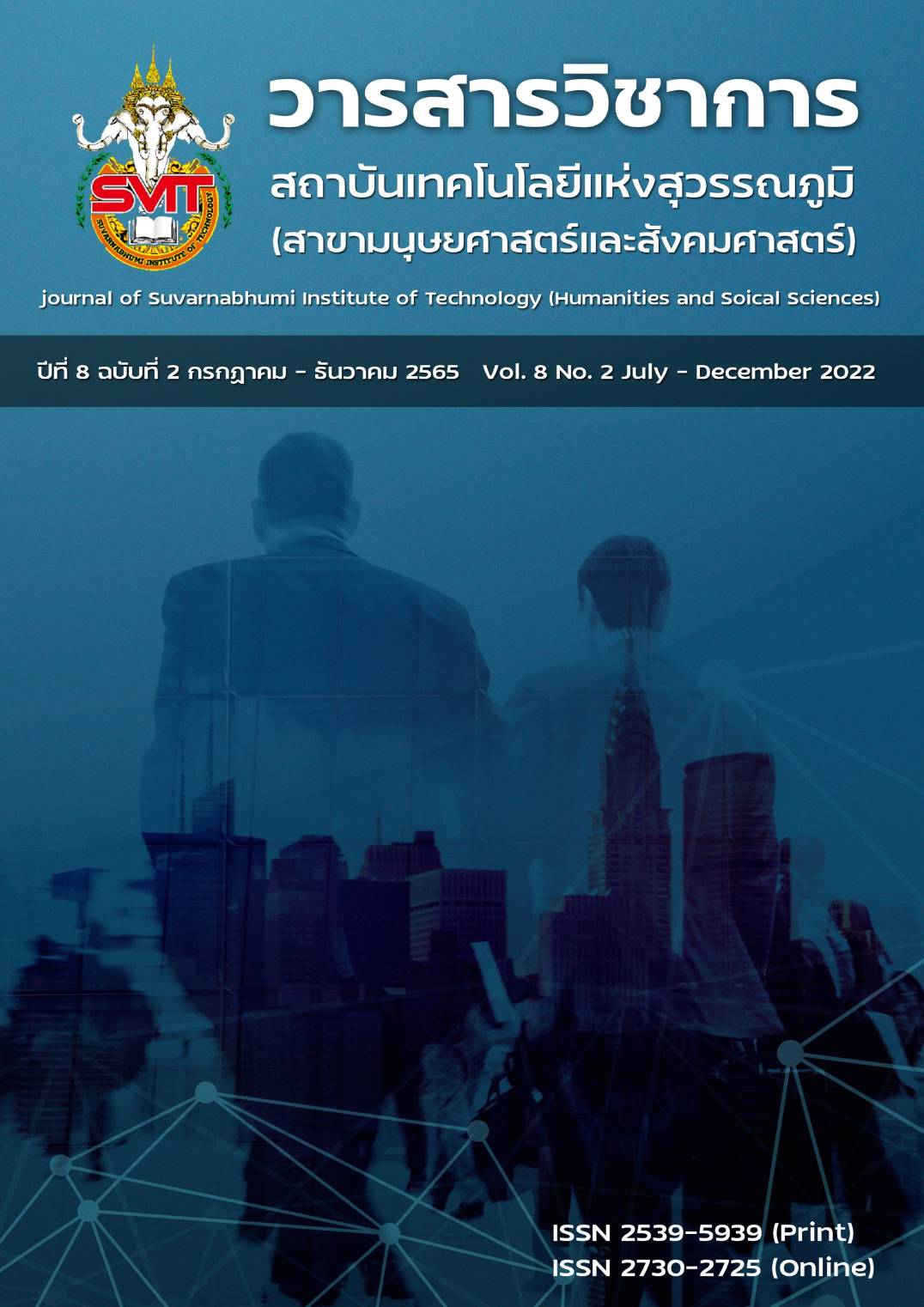THE DEMAND FOR VOCATIONAL WORKERS AND THE DESIRABLE ATTRIBUTES IN “THE ECONOMIC TRIANGLE OF STABILLTY, PROSPERITY, AND SUSTAINABILTY” 2010-2015 (PATTANI, YALA, AND NARATHIWAT PROVINCS)
Keywords:
worker characteristics, vocational workers, model city policy “The Economic Triangle of Stability, Prosperity, and SustainabilityAbstract
The objective of this research was to study the demand for vocational workers and the desirable attributes to support the model city policy of “the Economic Triangle of Stability, Prosperity, and Sustainability” in Thailand. Qualitative research, which consisted of document synthesis and the interviews, was used. 10 people from the target group were interviewed and the information was evaluated by 3 experts having roles in issuing policies and monitoring the work, who were Deputy Permanent Secretary, Ministry of Education; Advisor to the Special Representative of government sector of the Southern Border Provinces; and Director of the National Economic and Social Development Council for the South. The study was focused on vocational workers’ attributes needed to support model city policy of “the Economic Triangle of Stability, Prosperity, and Sustainability “ in the Southern Border Provinces (Pattani, Yala, and Narathiwat) of Thailand. The results of the research showed that within 5 years from 2020-2022, there would be a demand for 324 positions of vocational workers per year. The top three industries that needed vocational workers were 1) rubber, palm, fruit processing industries, 2) halal food industries, and 3) fishery. The top 3 labor attributes needed were 1) having knowledge including skills in Thai and English, Electrical skills (Electrical work, industrial control of electrical work, technology work for the power generation industry, and electrical transmission technology work); 2) physical aspect (being endurance, and skill of problem-solving with scientific thinking; and 3) psychological aspect (being moral and honest).
References
Cabinet Office. (2016). 13th News of the Minister's Office in 2016 on MOE Meeting on Integrated Education Management, Model City “Triangle, Stable, Prosperous, Sustainable”, Su-ngai Kolok District. Retrieved from https://www.moe.go.th/websm/2016/dec/513.html
Department of Industrial Works. (2018). Factory Registration Information. Retrieved from https://www.diw.go.th/hawk/content.php?mode=data1search
Department of Skill Development. (2017). Promoting the Development of Labor Skills. Bangkok: Division of Academic Affairs and Programs.
King Prajadhipok's Institute. (2019). Principles of good governance. Retrieved from https://www.good governance.kpi.ac.th/th/blog
Law, M., Stewart, D., Letts, L., Pollock, N., Bosch, J., & Westmorland, M. (1998). Guidelines for critical review of qualitative studies. Retrieved from https://tbzmed.ac.ir/ Uploads/3/cms/user/File/10/Pezeshki_Ejtemaei/conferance/dav.pdf
Madeeyoh, C., & Charumanee, N. (2013). The use of Islamic context texts to improve Muslim students’ English reading skills. Journal of Liberal Arts, Prince of Songkhla University, 5(2), 46-58.
Moodie, G. F. (2008). From vocational to higher education an international perspective. New York: McGraw-Hill.
Office of the National Economic and Social Development Board. (2017). 12th National Development Plan (2017-2021).
Retrieved from http://www.nesdb.go.th/ewt_dl_link.php?nid=6422
Office of the Permanent Secretary, Ministry of Education. (2016). 12th education development plan of the ministry of education (2017-2021). Retrieved from http://www.bpp.mua. go.th/main/download/plan/EducationPlan12.pdf
Office of the Permanent Secretary, Ministry of Education. (2018). Order entrusting the deputy minister of education instruct government officials and operate in the area to integrate and jointly develop policies, strategies and measures for educational development. Bangkok: Ministry of Education.
Office of the Permanent Secretary, Ministry of Education. (2019). MOE strengthening education in all areas to drive an integrated education plan in 6 sectors. Retrieved from https://www. egov.go.th/th/ content/10301/6633/
Phongprom, A. et al. (2017). Guidelines for the promotion and development of indigenous rice production with participation in the case of para rubber and oil palm farmers in the southern land reform area. Bangkok: Office of
Agricultural Land Reform (A.L.R.).
Soonthornsing, W., & Chuanchom, J. (2008). Characteristics of human resource personnel based on the opinions of entrepreneurs in ratchathewi dstrict: case study. bangkok. Independent research, Master of Business Administration, Human Resources Management, Graduate School, Suan Dusit Rajabhat University.
Srimarut, T. (2012). Research report on safety behavior in the operation of the production staff in the practitioner level. Bangkok: Suan Sunandha Rajabhat University.
The Center for Coordinating and Administration of Education in the Southern Border Provinces. (2018). Joining in forces to drive education management in the southern border provinces. Retrieved from https://www.dailynews.co.th/article/ 802379/
Thuannadee, A. (2016). Analysis of Demand for Qualitative Labor of Industrial Sector in Chonburi Province under Liberalization of the ASEAN Economic Community. Journal of Economics and Management Strategy, 3(2), 34-49.
Downloads
Published
Issue
Section
License
Copyright (c) 2022 Suvarnabhumi Institute of Technology

This work is licensed under a Creative Commons Attribution-NonCommercial-NoDerivatives 4.0 International License.
The articles published are copyrighted by the Sarasas Journal of Humanities and Social Science. The opinions expressed in each article in this academic journal are those of the individual authors and do not reflect the views of Sarasas Suvarnabhumi Institute of Technology. The authors are solely responsible for all aspects of their respective articles. Any errors or inaccuracies in the articles are the sole responsibility of the authors.



